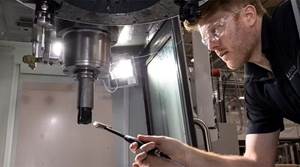CAM And California Manufacturer Aim For 'Any Mold In Ten Days'
If self threading screws, accumulated out-of-tolerance buildup, warpage, impact resistance, cosmetic appearance, assembly to other parts and snap fits are not perfect, it's the scrap bin for expensive production.
Share





Self threading screws, accumulated out-of-tolerance buildup, warpage, impact resistance, cosmetic appearance, assembly to other parts and snap fits are just a few of the critical design concerns every engineer faces. If all that—and more—is not perfect, it's the scrap bin for expensive production molds and the red side of the ledger for wasted programming, machine time and materials.
To try to avoid the financial loss and negative impact on production scheduling, some manufacturers have tried Stereolithography. While right for some applications, parts molded by UV laser are formed slowly and, worse, the SL epoxy can not be used in process applications and testing. Valid comparisons are said to be out of the question, even though each part can cost well into the thousands of dollars.
Imagine how popular a business could become if it could offer their customers production-quality molded parts at a fraction of the cost and time of production tooling: real parts that can be fully tested; true-material molding that confirms gating, injection, ejection—all process characteristics—without the high cost of production molds. Jay Riddle's Corona, California-based Advanced Technology (AT) does just that, and business is good.
Three years ago, Mr. Riddle and his people were working product development with major producers when they decided that Advanced Technology, true to its name, could combine its total-CNC operation with powerful PC-based Mastercam AE software to make a quantum leap into 10-day parts prototyping. According to Mr. Riddle, "The basic idea is simple: build a real part as quickly as possible." That, he says, gives AT's customers the competitive advantage of a significantly faster learning curve in putting that part into production.
Mr. Riddle asserts that, though three weeks is the typical time needed to design a mold, Advanced Technologies designs molds for small- to medium-size production parts in one day. That's a real economy for projects requiring, say, only 5,000 parts over a two-year production schedule, saving the cost-per-piece amortization of very expensive tooling. The cost of market sampling for products on the very volatile consumer market—cellular phones, for example—is similarly reduced.
Here's how they do it. Advanced Technology takes inventory of every part needed to build a mold. When customers' designs are received, precut core and cavity insert blanks are machined to spec and plugged into the proprietary mold base. That's Mr. Riddle's competitive edge in a nutshell.
Most customers e-mail ProEngineer files or surface trimmed IGES files to Advanced Technology where the ProEngineer files are converted to IGES. Since each of the company's CNC machines is linked to a dedicated PC running Mastercam (by CNC Software, Tolland, Connecticut), these files are translated into IGES and imported directly into the Mastercam program. Other moldmakers confirm that the program lets them import ACIS (solids), DXF, CADL, VDA, DWG—virtually any format—with ease.
Some specifics about how the company produces the final core and cavity are proprietary but Mr. Riddle readily admits that it's the ability to customize Mastercam that put them in this business. "It lets us do a perfect job faster than anyone." He believes that having Mastercam in-house is a must for any entrepreneurial moldmaker. He says that his people make the most of the program's tool path capabilities by selecting the best machining strategies for a whole part or a difficult section. And he credits Mastercam's highly accurate and flexible tool path verification with virtually eliminating tool damage and missed material.
Mastercam checks tool paths on-screen on a piece of "virtual stock," generating a solid model of the part that can be inspected just like a finished workpiece. His mold inserts are machined right the first time out which, he says, is a major contribution to production speed. Every phase of the mold passes through Mastercam, from simply drilling a hole to sculpturing a 3D surface. To complement Mastercam's speed, Mr. Riddle and crew developed a proprietary, easily-machinable material to accelerate the machining process. They started with a 20,000-unit cycle cavity life, then 100,000. At this writing, output is said to be almost unlimited. "There's no question we're pushing the envelope of technology," Mr. Riddle says, proudly. "That's how we continue to get better at what we do."
One company, making in-flight television sets, put Advanced Technology's capabilities to profitable use. The tiny units mount on the arms of the first-class seats in many long-range commercial aircraft. All parts had to meet FAA regulations and undergo rigorous flammability and structural tests. It was mandatory that testing be done on real production parts. The manufacturer, used to working in metals, had no plastics capability, so tooling up for plastics would be particularly uneconomical. Also, Mr. Riddle estimates, their chance of hitting the mark by sending their design to a conventional shop for costly ground tool steel molds—a 14- to 18-week process overall—was about 50/50, compared to Advanced Technology's 10-day delivery. "Companies that can turn development times from months into weeks will win the market; it's that simple," observes Mr. Riddle.
Companies like Hewlett Packard, that need several thousand parts for limited production runs on new products, also see the clear advantage. Mastercam's learning curve helps keep AT's production on schedule. Mr. Riddle says "It's a user-friendly piece of software. We take a machinist or toolmaker mind set and very quickly orient it to Mastercam." The combination of the program's graphical user interface with its documentation and on-line help also impresses Mr. Riddle. He has trained a core group of machinists—not traditional moldmakers—to apply Mastercam to AT's unique process and they become Advanced Technology 10-Day Specialists.
Mr. Riddle had investigated other programs in depth, finally deciding on Mastercam because he liked the system's abilities and ease of use. He also learned that Mastercam had an excellent reputation with other shops. Once he was comfortable with the system, the "10 Days" inspiration hit. With its translators and 3-D surface modeling and rendering, we're constantly finding new applications." AT's Mastercam dealer/customer relationship helps Mr. Riddle keep his audacious delivery guarantee, as well. "Our dealer is on the spot with just a phone call if we need help with a unique application of a Mastercam function."
Mr. Riddle acknowledges that there are some limitations to the "10 Days" promise. Overall part size can't exceed seven inches in any dimension and Advanced Technology's molds can only be run in their shop. Also, the company's niche, small quantities with quick turnaround, makes parts runs of over 100,000 non-competitive. That suits him just fine. Advanced Technologies' 10-day moldmaking is an innovation filling a need in the industry. The unlimited tool life of their specialized mold material promises a new dawn in AT's fast-food production of gourmet-quality molded plastic parts.
Related Content
How this Job Shop Grew Capacity Without Expanding Footprint
This shop relies on digital solutions to grow their manufacturing business. With this approach, W.A. Pfeiffer has achieved seamless end-to-end connectivity, shorter lead times and increased throughput.
Read MoreHow to Mitigate Chatter to Boost Machining Rates
There are usually better solutions to chatter than just reducing the feed rate. Through vibration analysis, the chatter problem can be solved, enabling much higher metal removal rates, better quality and longer tool life.
Read MoreTips for Designing CNC Programs That Help Operators
The way a G-code program is formatted directly affects the productivity of the CNC people who use them. Design CNC programs that make CNC setup people and operators’ jobs easier.
Read MoreOrthopedic Event Discusses Manufacturing Strategies
At the seminar, representatives from multiple companies discussed strategies for making orthopedic devices accurately and efficiently.
Read MoreRead Next
Setting Up the Building Blocks for a Digital Factory
Woodward Inc. spent over a year developing an API to connect machines to its digital factory. Caron Engineering’s MiConnect has cut most of this process while also granting the shop greater access to machine information.
Read MoreRegistration Now Open for the Precision Machining Technology Show (PMTS) 2025
The precision machining industry’s premier event returns to Cleveland, OH, April 1-3.
Read More5 Rules of Thumb for Buying CNC Machine Tools
Use these tips to carefully plan your machine tool purchases and to avoid regretting your decision later.
Read More























.jpg;maxWidth=300;quality=90)












